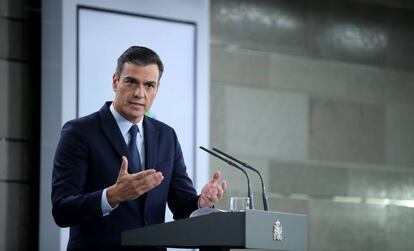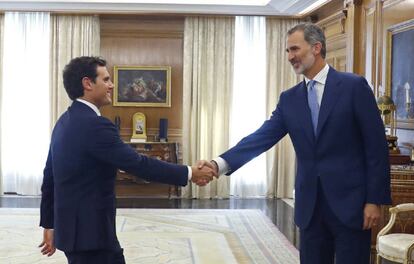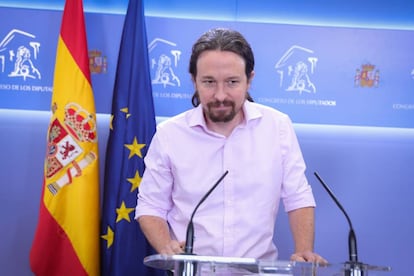Spain headed for fourth election in four years, as parties fail to do deals
Political leaders have spent the last two days meeting with King Felipe VI, who announced via a statement on Tuesday evening that he would not be proposing a candidate for another investiture vote

Spain is closer than ever to its fourth general election in as many years, after its political parties failed to reach a governing deal in the wake of the inconclusive April 28 polls. Despite months of negotiations, no agreement has been reached between the Socialist Party (PSOE), which won most seats at the April vote but fell short of a majority, and its most likely partner, left-wing Unidas Podemos. Acting Prime Minister Pedro Sánchez has also been unable to strike any kind of deal with the two other biggest parties on Spain’s political spectrum, the conservative Popular Party (PP) and center-right Ciudadanos (Citizens).
Following established procedure, for the last two days Spain’s King Felipe VI has been meeting with the leaders of parties with a congressional presence to see whether Sánchez had enough support among the deputies in Spain’s lower house of parliament, Congress, to be voted back into office as prime minister.
After the round of meetings concluded, Meritxell Batet, the speaker of Congress, went to meet the king to discuss his conclusions. After that encounter, the Royal Household released an official statement saying that the king would not be presenting a candidate. Felipe VI, the document read, “has concluded that there is no candidate who counts on the necessary support for the Congress of Deputies to lend him its confidence.”

Barring any last-minute surprises, parliament will be dissolved next week and a repeat general election called for November 10.
One last-ditch attempt is, however, still possible. Formally speaking, no deadline has passed today. The last moment that an investiture vote could take place is by midnight on September 23. This means that the king could still propose a candidate should Spain’s political parties inform him that someone has the support for an investiture vote, but they would have to do this deal between Wednesday and Thursday of this week in order to beat the procedural clock.
After meeting with eight party leaders on Monday, the monarch sat down on Tuesday with representatives from the Catalan nationalists of Junts per Catalunya (Together for Catalonia), En Comú Podem (the Catalan branch of Podemos), far-right Vox, Unidas Podemos, Ciudadanos, the PP and the PSOE.

The picture that emerged as the day progressed was a pessimistic one, with most parties telling the king that they planned to either vote against Sánchez, or at the very least abstain, if he should decide to submit to a vote this coming weekend. For its part, the PSOE has repeatedly made clear that Sánchez would not stand at a fresh investiture vote should he not have the necessary support to win it.
At around 9pm on Tuesday evening, Sánchez spoke to reporters, saying that he “had tried by all means available but they made it impossible for me,” in reference to the other parties involved in talks. “I tried to form the government that, in my judgment, Spain needs in the face of the challenges that are ahead of us. Spain does not need a government for an investiture,” he added, “but rather a government for the term.”
He continued saying that “two conservative political forces [the PP and Ciudadanos] and a leftist political force [Unidas Podemos] have decided to block the formation of the government that Spaniards were calling for. Spaniards have said on four occasions that Spain wants to take a progressive route and we call on them to do so even more clearly on November 10.”
The leader of the PP, Pablo Casado, said on Tuesday evening after his meeting with the king that he “shared with the majority of Spaniards the sensation of not knowing how we have come to this point.” He added that his party’s position had been “coherent, responsible and open to dialogue,” claiming that he had “the feeling that we had got to the point that Sánchez wanted since April 28.”
Asked about the chance of a last-minute deal, Casado said: “I don’t think now is the time to try something that hasn’t been tried in the last five months.”
Sánchez has been refusing reiterated calls by Podemos for a coalition government in exchange for its support. The PSOE, which has 123 lawmakers in Congress following the April 28 election, is well short of the 175 seats needed to form a government, but for the last five months all attempts at majority-building have failed. Sánchez has been pushing for a single-party executive, and his earlier attempt to form a government failed after he submitted his plan to Congress in July and was voted down.
Just hours ahead of his own appointment with Felipe VI on Tuesday afternoon, Sánchez telephoned the leaders of the PP, Ciudadanos and Podemos to try to secure an 11th-hour deal and avoid a repeat election.
Power for nothing
But Podemos chief Pablo Iglesias, who met with the monarch on Tuesday morning, did not sound convinced. “Wanting to be prime minister in exchange for nothing – I’m not sure that’s the most reasonable thing,” he told reporters after walking out of his meeting.
And Ciudadanos chief Albert Rivera, who surprised everyone on Monday with an offer to abstain if certain conditions are met, on Tuesday withdrew the offer after describing Sánchez’s response as “a mockery.” The conditions involve a pledge not to raise income tax, reorganizing political alliances in the northern Spanish region of Navarre, and taking a hard line on the Catalan independence crisis.
Speaking on Tuesday evening after meeting with King Felipe, Rivera said that “Sánchez wants the other parties to give him our votes without any conditions in return. This is unheard of. If Sánchez forces elections, this country’s problem will have a name: Pedro Sánchez.”
Ciudadanos wants a written pledge that the government will not grant pardons to the Catalan secessionist leaders who were tried at the Supreme Court this year, if they should be found guilty in a ruling that’s expected in the coming weeks.
In a letter signed by Sánchez and sent to Ciudadanos on Tuesday morning, the PSOE insisted that they are already meeting with these conditions, and called on Rivera to “unblock the situation, honor the will of Spaniards and avoid a completely unnecessary repeat election.”
English version by Susana Urra and Simon Hunter.
Tu suscripción se está usando en otro dispositivo
¿Quieres añadir otro usuario a tu suscripción?
Si continúas leyendo en este dispositivo, no se podrá leer en el otro.
FlechaTu suscripción se está usando en otro dispositivo y solo puedes acceder a EL PAÍS desde un dispositivo a la vez.
Si quieres compartir tu cuenta, cambia tu suscripción a la modalidad Premium, así podrás añadir otro usuario. Cada uno accederá con su propia cuenta de email, lo que os permitirá personalizar vuestra experiencia en EL PAÍS.
¿Tienes una suscripción de empresa? Accede aquí para contratar más cuentas.
En el caso de no saber quién está usando tu cuenta, te recomendamos cambiar tu contraseña aquí.
Si decides continuar compartiendo tu cuenta, este mensaje se mostrará en tu dispositivo y en el de la otra persona que está usando tu cuenta de forma indefinida, afectando a tu experiencia de lectura. Puedes consultar aquí los términos y condiciones de la suscripción digital.








































